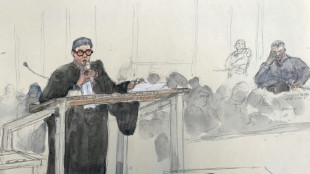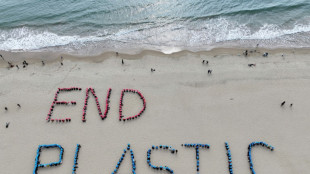
-
 Brazil's top court takes on regulation of social media
Brazil's top court takes on regulation of social media
-
Thousands still queuing to vote after Namibia polls close

-
 Trump taps retired general for key Ukraine conflict role
Trump taps retired general for key Ukraine conflict role
-
Canadian fund drops bid for Spanish pharma firm Grifols

-
 Argentine ex-president Fernandez gives statement in corruption case
Argentine ex-president Fernandez gives statement in corruption case
-
Mexico says Trump tariffs would cost 400,000 US jobs

-
 Car-centric Saudi to open first part of Riyadh Metro
Car-centric Saudi to open first part of Riyadh Metro
-
Brussels, not Paris, will decide EU-Mercosur trade deal: Lula

-
 Faeces, vomit offer clues to how dinosaurs rose to rule Earth
Faeces, vomit offer clues to how dinosaurs rose to rule Earth
-
Ruby slippers from 'The Wizard of Oz' up for auction

-
 Spain factory explosion kills three, injures seven
Spain factory explosion kills three, injures seven
-
US Fed's favored inflation gauge ticks up in October

-
 Defence lawyers plead to judges in French mass rape trial
Defence lawyers plead to judges in French mass rape trial
-
US says China releases three 'wrongfully detained' Americans

-
 New clashes in Mozambique as two reported killed
New clashes in Mozambique as two reported killed
-
Romania officials to meet over 'cyber risks' to elections

-
 Chelsea visit next stop in Heidenheim's 'unthinkable' rise
Chelsea visit next stop in Heidenheim's 'unthinkable' rise
-
Former England prop Marler announces retirement from rugby

-
 Kumara gives Sri Lanka edge on rain-hit day against South Africa
Kumara gives Sri Lanka edge on rain-hit day against South Africa
-
Namibia votes with ruling party facing toughest race yet

-
 Spurs goalkeeper Vicario out for 'months' with broken ankle
Spurs goalkeeper Vicario out for 'months' with broken ankle
-
Moscow expels German journalists, Berlin denies closing Russia TV bureau

-
 Spain govt defends flood response and offers new aid
Spain govt defends flood response and offers new aid
-
France says Netanyahu has 'immunity' from ICC warrants

-
 Nigerian state visit signals shift in France's Africa strategy
Nigerian state visit signals shift in France's Africa strategy
-
Stock markets waver as traders weigh Trump tariffs, inflation

-
 Tens of thousands in Lebanon head home as Israel-Hezbollah truce takes hold
Tens of thousands in Lebanon head home as Israel-Hezbollah truce takes hold
-
Opposition candidates killed in Tanzania local election

-
 Amorim eyes victory in first Man Utd home game to kickstart new era
Amorim eyes victory in first Man Utd home game to kickstart new era
-
Fresh fury as Mozambique police mow down protester

-
 Defeat at Liverpool could end Man City title hopes, says Gundogan
Defeat at Liverpool could end Man City title hopes, says Gundogan
-
Indonesians vote in regional election seen as test for Prabowo

-
 Guardiola says no intent to 'make light' of self harm in post-match comments
Guardiola says no intent to 'make light' of self harm in post-match comments
-
New EU commission gets green light to launch defence, economy push

-
 Opposition figures killed as Tanzania holds local election
Opposition figures killed as Tanzania holds local election
-
Taiwan Olympic boxing champion quits event after gender questions

-
 European stocks drop on Trump trade war worries
European stocks drop on Trump trade war worries
-
Volkswagen to sell operations in China's Xinjiang

-
 FA probes referee David Coote over betting claim
FA probes referee David Coote over betting claim
-
Serbia gripped by TV series about murder of prime minister

-
 Putin seeks to shore up ties on visit to 'friendly' Kazakhstan
Putin seeks to shore up ties on visit to 'friendly' Kazakhstan
-
New EU commission pushes for defence and economy spending

-
 Plastic pollution talks must speed up, chair warns
Plastic pollution talks must speed up, chair warns
-
Pakistan web controls quash dissent and potential

-
 1,000 Pakistan protesters arrested in pro-Khan capital march
1,000 Pakistan protesters arrested in pro-Khan capital march
-
ICC prosecutor seeks arrest warrant for Myanmar junta chief

-
 Philippine VP's bodyguards swapped out amid investigation
Philippine VP's bodyguards swapped out amid investigation
-
EasyJet annual profit rises 40% on package holidays

-
 Ukraine sees influx of Western war tourists
Ukraine sees influx of Western war tourists
-
Greeks finally get Thessaloniki metro after two-decade wait


Maximum life term for sole surviving Paris 2015 attacker
The sole surviving member of an Islamic State terror cell that killed 130 people in Paris in November 2015 was handed a whole-life sentence on Wednesday at the end of a trial that aimed to draw a line under the worst peace-time atrocity in modern French history.
Salah Abdeslam, a 32-year-old Frenchman of Moroccan origin, was captured alive by police four months after the bloodbath at the Bataclan concert hall and other locations.
His sentence, the toughest possible, was read out by the head of a five-judge panel overseeing the trial of 20 men accused of involvement in the assault on the capital.
"The sentences are quite heavy," one tearful survivor, Sophie, told AFP as she left the court in central Paris. "I feel a lot of relief. Ten months of hearings -- it's helped us to rebuild."
The trial has been the biggest in modern French history, the culmination of a six-year international investigation whose findings run to more than a million pages.
The other 19 suspects, accused of either plotting or offering logistical support, were also found guilty, with their sentences ranging from two years to life in prison.
All of the attackers except for Abdeslam blew themselves up or were killed by police during or after the assault.
Hundreds of victims and witnesses packed out the benches of the specially constructed courtroom as the sentences were read out.
"My first reaction is that we have the feeling of turning a page after the verdicts," Gerard Chemla, a lawyer representing victims at the trial, told reporters.
- Change of heart? -
Abdeslam had begun his appearances last September by defiantly declaring himself as an "Islamic State fighter" but finished tearfully apologising to victims and asking for leniency.
In his final statement, he urged the judges not to give him a full-life term, seeking to emphasise that he had not killed anyone himself.
"I made mistakes, it's true. But I'm not a murderer, I'm not a killer," he said.
His lawyers had also argued against the whole-life sentence, which prosecutors had demanded.
It offers only a small chance of parole after 30 years and has been pronounced only four times previously since being created in 1994.
Abdeslam, a one-time pot-smoking lover of parties, discarded his suicide belt on the night of the attack and fled back to his hometown, Brussels, where many of the extremists lived.
He told the court that he had had a change of heart and decided not to kill people.
"I changed my mind out of humanity, not out of fear," he insisted.
But prosecutors argued that he played a key role in organising the attacks and that his equipment simply malfunctioned.
- Trauma -
A team of 10 jihadists laid siege to the French capital, attacking the national sports stadium, bars, and the Bataclan in an assault immediately claimed from Syria by the IS group.
The attacks shocked France, with the choice of targets and the manner of the violence seemingly designed to inflict maximum fear, just 10 months after a separate assault on the Charlie Hebdo magazine.
In one instance, the court heard a recording of gunmen taunting people trapped in the Bataclan as they fired on them with Kalashnikov machine guns from a balcony above.
The huge loss of life marked the start of a gruesome and violent period in Europe as IS ramped up attacks across the continent.
France, under then president Francois Hollande, declared the country "at war" with the extremists and their self-proclaimed caliphate in Syria and Iraq.
Hollande, who testified in November, called the trial "exceptional" and "exemplary", adding in a statement that the accused had been "judged with respect for the law".
The 10-month process had "enabled us to look for the truth in order to better understand the course of Islamist terrorism", he said.
- Other culprits -
In the absence of the rest of the attackers, the men on trial besides Abdeslam were suspected of offering mostly logistical support or plotting other attacks.
Only 14 out of the 20 appeared in person, with the rest missing, presumed dead.
One of them, Mohamed Abrini, admitted to driving some of the Paris attackers to the capital and explained how he was meant to take part but backed out.
The 37-year-old also started out justifying IS violence as part of a fight against Western countries, but ended by apologising to victims in the trial's final stages.
The court handed him a life sentence with 22 years as a minimum term.
Also on trial was Swedish citizen Osama Krayem, who has been identified in a notorious IS video showing a Jordanian pilot being burned alive in a cage.
The pair were suspected of planning an attack on Amsterdam airport.
Mohamed Bakkali, a Belgian-Moroccan logistics coordinator, was handed the same sentence.
All of the convicted are able to appeal their verdicts and sentences.
burs-adp-sjw/jj
F.Pavlenko--BTB

